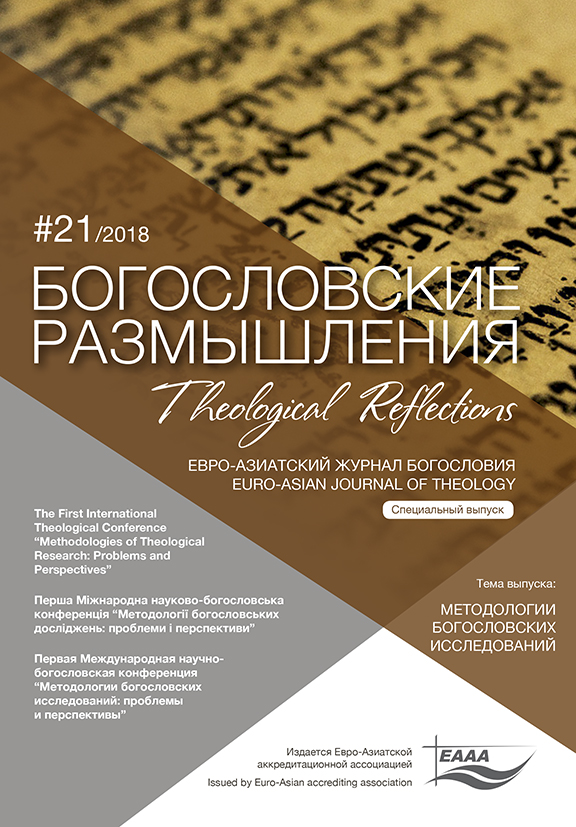Theology after Enlightenment: Between Moral and Religion (from Daniel Defoe to Martin Buber)
DOI:
https://doi.org/10.29357/2521-179X.2018.21.5Keywords:
God, religion, morality, Enlightenment, dialogue, revelation.Abstract
The article considers the questions of relations between religion and morality, how it appeared in the culture of European Enlightenment, and its further theological resonance. Already in the beginning of the 18th century the problem of relations between religion and morality was eloquently considered in Daniel Defoe’s “Robinson Crusoe”. The main character of this novel, who happened to be alone at a desert island, first becomes a true Christian, and then tests his moral, and only later on also religious attitudes in communication with the local cannibal, meaningfully called “Friday”. Voltaire in his L’Ingénu develops this problem further: his character, an Indian converted into Christianity, spontaneously arrives to all-rounded moral criticism of Christianity. Marquis de Sade in his La Philosophie dans le boudoir takes up this motive of all-rounded moral criticism of Christianity, but comes to much more radical conclusions: if a truly rational person necessarily will reach atheism, common people need religion in order to feel certain moral limits; however, this religion cannot be Christianity. Finally, Martin Buber’s works show how topical this problem, discovered by the Enlightenment, remains also in our contemporary culture – and, also, which peculiar difficulties and perspectives appear here in the theological dimension. To solve the problem, posed by the Enlightenment, Buber has to draw a distinction between religion and religiosity, and also postulate continuity of God’s revelation and dialogue between human being and God.
References
- Bacon, Francis. Novum Organum, in The Works of Francis Bacon, vol. 1, Philosophical Works, vol. 1 (New York: Garrett Press, Inc., 1872), 119-365.
- Buber, Martin. Zwiesprache: Traktat vom dialogischen Leben. Heidelberg: Verlag Lambert Schneider GmbH, 1978.
- Defoe, Daniel. The Life and Strange Surprising Adventures of Robinson Crusoe of York, Mariner, web edition by The University of Adelaide Library, University of Adelaide, South Australia 5005, last updated Sunday, March 27, 2016 at 11:53 (електронний ресурс: https://ebooks.adelaide.edu.au/d/defoe/daniel/d31r/index.html, assessed April 21, 2018).
- Durkheim, Emile. Les Formes élémentaires de la vie religieuse : le système totémique en Australie. Paris: Quadridge-PUF, 1912.
- Marquis de Sade, La Philosophie dans le boudoir ou Les Instituteurs immoraux (La Bibliothèque électronique du Québec: Collection Libertinage, Volume 6: version 1.0, 2002) (електронний ресурс: https://beq.ebooksgratuits.com/libertinage/Sade_La_philosophie_dans_le_boudoir.pdf, assessed April 21, 2018).
- McInelly, Brett C. “Expanding Empires, Expanding Selves: Colonialism, the Novel, and Robinson Crusoe”, in Studies in the Novel 1/35 (spring 2003): 1-21.
- Voltaire. L’Ingénu. Paris: Éditions du Boucher, 2002.
- Елистратова А. А. Английский роман эпохи Просвещения. Москва: Зарубежная литература, 1966.
Downloads
How to Cite
Issue
Section
License
Copyright (c) 2020 Oleksiy PANYCH

This work is licensed under a Creative Commons Attribution-NonCommercial 4.0 International License.
All articles published in the Journal are distributed under a Creative Commons Attribution-NonCommercial 4.0 International License
By submitting an article for publication in Theological Reflections: Eastern European Journal of Theology the author grants the editors the right to publish the article and distribute it in electronic and print form.
The author reserves all copyrights and the right to use the materials of the article in whole or in part for educational purposes, to write his own dissertations, to prepare abstracts, conference reports, oral presentations, etc., as well as post electronic copies of articles (including the final electronic version downloaded from the journal’s official website) on non-commercial web-resources without the consent of the editorial board and founders.



